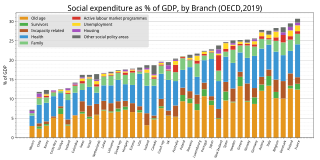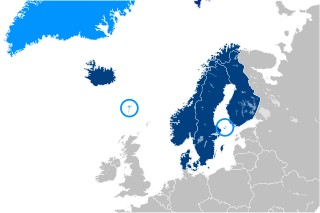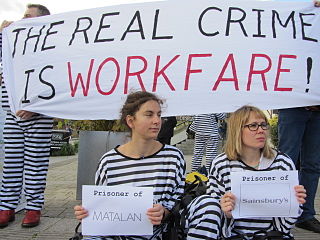Related Research Articles
A minimum wage is the lowest remuneration that employers can legally pay their employees—the price floor below which employees may not sell their labor. Most countries had introduced minimum wage legislation by the end of the 20th century. Because minimum wages increase the cost of labor, companies often try to avoid minimum wage laws by using gig workers, by moving labor to locations with lower or nonexistent minimum wages, or by automating job functions. Minimum wage policies can vary significantly between countries or even within a country, with different regions, sectors, or age groups having their own minimum wage rates. These variations are often influenced by factors such as the cost of living, regional economic conditions, and industry-specific factors.

The Swedish Social Democratic Party, formally the SwedishSocial Democratic Workers' Party, usually referred to as The Social Democrats, is a centre-left social-democratic, and democratic socialist political party in Sweden. Founded in 1889, the SAP is the country's oldest and currently largest party.

A welfare state is a form of government in which the state protects and promotes the economic and social well-being of its citizens, based upon the principles of equal opportunity, equitable distribution of wealth, and public responsibility for citizens unable to avail themselves of the minimal provisions for a good life.
Unemployment benefits, also called unemployment insurance, unemployment payment, unemployment compensation, or simply unemployment, are payments made by authorized bodies to unemployed people. In the United States, benefits are funded by a compulsory governmental insurance system, not taxes on individual citizens. Depending on the jurisdiction and the status of the person, those sums may be small, covering only basic needs, or may compensate the lost time proportionally to the previous earned salary.

The working poor are working people whose incomes fall below a given poverty line due to low-income jobs and low familial household income. These are people who spend at least 27 weeks in a year working or looking for employment, but remain under the poverty threshold.
Workfare is a governmental plan under which welfare recipients are required to accept public-service jobs or to participate in job training. Many countries around the world have adopted workfare to reduce poverty among able-bodied adults; however, their approaches to execution vary. The United States and United Kingdom are two countries utilizing workfare, albeit with different backgrounds.

Temporary Assistance for Needy Families is a federal assistance program of the United States. It began on July 1, 1997, and succeeded the Aid to Families with Dependent Children (AFDC) program, providing cash assistance to indigent American families through the United States Department of Health and Human Services. TANF is often simply referred to as welfare, but some argue this is a misnomer. Unlike AFDC, which provided a guaranteed cash benefit to eligible families, TANF is a block grant to states that creates no federal entitlement to welfare and is used by states to provide non-welfare services, including educational services, to employed people.

David Edward Card is a Canadian-American labour economist and the Class of 1950 Professor of Economics at the University of California, Berkeley, where he has been since 1997. He was awarded half of the 2021 Nobel Memorial Prize in Economic Sciences "for his empirical contributions to labour economics", with Joshua Angrist and Guido Imbens jointly awarded the other half.

The Personal Responsibility and Work Opportunity Reconciliation Act of 1996 (PRWORA) is a United States federal law passed by the 104th United States Congress and signed into law by President Bill Clinton. The bill implemented major changes to U.S. social welfare policy, replacing the Aid to Families with Dependent Children (AFDC) program with the Temporary Assistance for Needy Families (TANF) program.
Active labour market policies (ALMPs) are government programmes that intervene in the labour market to help the unemployed find work, but also for the underemployed and employees looking for better jobs. In contrast, passive labour market policies involve expenditures on unemployment benefits and early retirement. Historically, labour market policies have developed in response to both market failures and socially/politically unacceptable outcomes within the labor market. Labour market issues include, for instance, the imbalance between labour supply and demand, inadequate income support, shortages of skilled workers, or discrimination against disadvantaged workers.

Social welfare has long been an important part of New Zealand society and a significant political issue. It is concerned with the provision by the state of benefits and services. Together with fiscal welfare and occupational welfare, it makes up the social policy of New Zealand. Social welfare is mostly funded through general taxation. Since the 1980s welfare has been provided on the basis of need; the exception is universal superannuation.

In economics, a negative income tax (NIT) is a system which reverses the direction in which tax is paid for incomes below a certain level; in other words, earners above that level pay money to the state while earners below it receive money, as shown by the blue arrows in the diagram. NIT was proposed by Juliet Rhys-Williams while working on the Beveridge Report in the early 1940s and popularized by Milton Friedman in the 1960s as a system in which the state makes payments to the poor when their income falls below a threshold, while taxing them on income above that threshold. Together with Friedman, supporters of NIT also included James Tobin, Joseph A. Pechman, and Peter M. Mieszkowski, Jim Gray and even then-President Richard Nixon, who suggested implementation of modified NIT in his Family Assistance Plan. After the increase in popularity of NIT, an experiment sponsored by the US government was conducted between 1968 and 1982 on effects of NIT on labour supply, income, and substitution effects.
A market intervention is a policy or measure that modifies or interferes with a market, typically done in the form of state action, but also by philanthropic and political-action groups. Market interventions can be done for a number of reasons, including as an attempt to correct market failures, or more broadly to promote public interests or protect the interests of specific groups.

Dennis J. Snower is an American-German economist, specialising in macroeconomic theory and policy, labor economics, digital governance, social economics, and the psychology of economic decisions in "caring economics". He is President of the Global Solutions Initiative in Berlin, Professorial Research Fellow at the Institute for New Economic Thinking at Oxford University, Fellow at the New Institute in Hamburg, and Non-resident Fellow of the Brookings Institution in Washington, D.C. He is former president of the Kiel Institute for the World Economy. His prominent labor research explores the role of “insiders” and “outsiders” in generating unemployment and macroeconomic fluctuations; his socio-economic research examines how social groups shape economic behavior; his psycho-economic research explains how economic decisions depend on psychological motives; and his macroeconomic research investigates why inflation and unemployment can move in opposite directions even in the long run.

Social security or welfare in Finland is very comprehensive compared to what almost all other countries provide. In the late 1980s, Finland had one of the world's most advanced welfare systems, which guaranteed decent living conditions to all Finns. Created almost entirely during the first three decades after World War II, the social security system was an outgrowth of the traditional Nordic belief that the state is not inherently hostile to the well-being of its citizens and can intervene benevolently on their behalf. According to some social historians, the basis of this belief was a relatively benign history that had allowed the gradual emergence of a free and independent peasantry in the Nordic countries and had curtailed the dominance of the nobility and the subsequent formation of a powerful right wing. Finland's history was harsher than the histories of the other Nordic countries but didn't prevent the country from following their path of social development.
The Labor policy in the Philippines is specified mainly by the country's Labor Code of the Philippines and through other labor laws. They cover 38 million Filipinos who belong to the labor force and to some extent, as well as overseas workers. They aim to address Filipino workers’ legal rights and their limitations with regard to the hiring process, working conditions, benefits, policymaking on labor within the company, activities, and relations with employees.
Unemployment insurance, also known as 失業保険, is the "user pays" system of unemployment benefits that operates in Japan. It is paired with Workers' Accident Compensation Insurance and referred to collectively as Labour insurance. It is managed by Hello Work.

The Social Research and Demonstration Corporation (SRDC) is an independent non-profit and non-partisan social policy research organization based in Canada, with a focus on designing, implementing and evaluating large-scale demonstration projects.

Workfare in the United Kingdom is a system of welfare regulations put into effect by UK governments at various times. Individuals subject to workfare must undertake work in return for their welfare benefit payments or risk losing them. Workfare policies are politically controversial. Supporters claim that such policies help people move off welfare and into employment whereas critics argue that they are analogous to slavery or indentured servitude and counterproductive in decreasing unemployment.
Welfare in California consists of federal welfare programs—which are often at least partially administered by state and county agencies—and several independent programs, which are usually administered by counties.
References
- ↑ Michalopoulos, Charles, Philip K. Robins and David Card. 2005. "When financial work incentives pay for themselves: evidence from a randomized social experiment for welfare recipients." Journal of Public Economics.
- ↑ Card, David; Michalopoulos, Charles; Robins, Philip (August 2001). "The Limits to Wage Growth: Measuring the Growth Rate of Wages For Recent Welfare Leavers". NBER Working Papers.
- ↑ Blundell, Richard (May 2002). "(Lecture) Welfare-to-Work: Which Policies Work and Why?" (PDF). ifs.org.uk. Archived from the original (PDF) on 9 August 2017.
- ↑ Bloom, Dan; Charles, Michalopoulos (May 2001). "How Welfare and Work Policies Affect Employment and Income: A Synthesis of Research" (PDF). mdrc.org. Archived (PDF) from the original on 16 Jan 2024. Retrieved 16 Jan 2024.